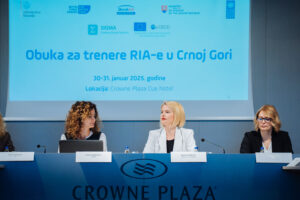To advance the implementation of a Regulatory Impact Assessment in Montenegro, a targeted training for 20 officials from line ministries was organized.
Currently, the RIA process in Montenegro evaluates the impact of regulations on the economy, citizens, and the budget. The Ministry of Finance of Montenegro aims to expand it to include the expected impact on society and the environment before regulatory decisions are finalized. This shift toward a full RIA requires thorough preparation, beginning with targeted training for RIA network. The network consists of officials appointed on behalf of each ministry and municipality.
20 officials from the line ministries who actively participate in RIA processes took part in a two-day training of trainers on January 30 and 31, 2025 in Montenegro. Present were representatives from the Ministry of Economic Development, Ministry of Public Administration, Ministry of European Affairs, Ministry of Culture and Media, Ministry of Defense, Ministry of Justice, Ministry of Transport, and the Human Resources Administration.
Key insights from the RIA training
The training provided participants with an in-depth understanding of the key aspects of RIA, particularly focusing on the newly introduced components of the full RIA model. Additionally, the training had a practical component, featuring analyses of specific draft regulations that ministries plan to adopt in 2025. Through an interactive approach, attendees actively engaged in discussions and exercises to enhance their understanding of regulatory solutions.
The participants also reviewed key findings from the Public Administration Principles Assessment Report published by OECD/SIGMA in January 2025. The report recognized Montenegro as the top-rated country in the Western Balkans for its application of RIA, reflecting the country’s commitment to evidence-based policymaking.
This achievement is an indirect outcome of previous efforts aimed at equipping municipal officers with the knowledge and skills needed to implement new RIA standards. These initiatives were carried out under the Public and Private Finance for Development project (PPFD), supported by the Ministry of Finance of the Slovak Republic and implemented by UNDP. The training was part of a local project within PPFD, conducted in cooperation with the Ministry of Finance of Montenegro and OECD/SIGMA.
Practical application and future steps
As part of the training, participants developed draft RIA reports, which will serve as a prerequisite for receiving certification of successful completion. Looking ahead, new trainers in this field will be identified to conduct further training sessions. This will ensure the widespread adoption of full RIA practices.
Link to an article by the Government of Montenegro: https://www.gov.me/clanak/odrzana-dvodnevna-obuka-trenera-za-clanove-ria-mreze



